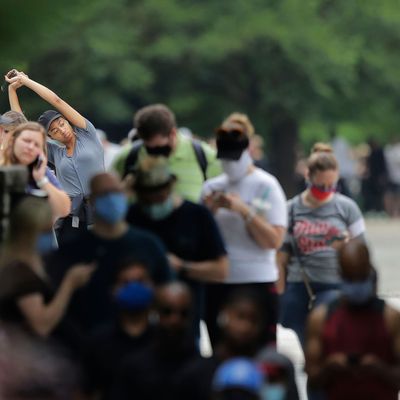
From a distance, you might have assumed the big problem facing election officials and voters in Georgia’s combined presidential and down-ballot primary today was the kind of surge in mail ballots that has overwhelmed the system in other states this year. And indeed, Georgians are voting by mail in unprecedented numbers (an estimated 2,500 percent increase over the 2016 primary), in part because the state mailed applications to all active registered voters and a delay in the presidential primary due to coronavirus concerns created an unusually long window for absentee voting.
But as primary day arrived, the big, bad news involved in-person balloting, particularly in Democratic strongholds in Atlanta and nearby inner suburbs. Atlanta Mayor Keisha Lance Bottoms was among many local officials who sounded an alarm:
The chaos was multifaceted, as the Atlanta Journal-Constitution reported:
Confusion surrounded the voting process at Barack Obama Elementary School in South Dekalb’s Gresham Park, said Jennifer Aton, 32.
Alton arrived at 6:50 a.m. because she never received the absentee ballot she requested.
Her voting precinct had moved from a nearby church to the school, where voters were supposed to stand in two separate lines to different rooms based on their neighborhood. But poll workers did not tell voters there were two lines, and few paid attention to small posters telling them where to stand.
Poll workers shifted voters from one line to the other or one room to the other, which made voters appear to be cutting in line when they were not, Aton said.
A lot of the problem appears to stem from new touchscreen voting machines the state’s Republican leadership insisted on buying and installing. They were supposed to receive a test run in the relatively simple presidential primary, which was originally scheduled for March but was canceled and combined with the regular June down-ballot primary. So machines are breaking down left and right, and some polling places have an insufficient supply of the provisional ballots voters are supposed to be offered when that happens.
The problems are apparently most severe in Fulton County, the state’s largest, which includes most of Atlanta. But they extend to inner suburban Dekalb (a heavily African-American and Democratic county) and Gwinnett (trending Democratic) counties. Republican Secretary of State Brad Raffensperger’s office is blaming Democratic county officials, and county officials are blaming the state. Both sides probably have a good case. As in most states, polling places in Georgia are largely operated by barely paid volunteers, many of them very elderly. But the state hasn’t earned much trust (Raffensperger is the successor to now-Governor Brian Kemp, a legendary election manipulator).
As in many other states, African-Americans are significantly more likely to vote in person than by mail. They represented 36 percent of the roughly quarter of a million Georgians who took advantage of in-person early voting. And there were definite signs during that early voting period of the problems plaguing Atlanta-area balloting today, as the Georgia Recorder noted:
Voters at College Park’s library precinct waited more than six hours to cast ballots on a sometimes rainy Friday as in-person early voting came to a close, an indication that Georgia’s new ballot-marking equipment will be put to the test Tuesday under COVID-19 safety precautions that were not part of the plan.
The line stretched out longer than it might have before the pandemic, with many voters observing six-foot social distancing guidelines. But social distancing was difficult in the small library space where the voting equipment was wiped between each use and masks sometimes muffled communications.
Reductions in polling places and poll-worker shortages were becoming obvious as well:
10% of polling locations are relocated or closed for this election, the result of fewer poll workers who tend to be older and vulnerable to COVID-19. Also, churches and schools that typically serve as neighborhood precincts remain closed as Georgia’s COVID-19 spread is slowed but still continues. Fulton County elections officials, who operate the College Park library precinct, over the weekend called for 250 more people to work at the polls Tuesday.
The problems with in-person voting may soon be compounded by an excruciatingly slow count of mail ballots. Georgians used to very quick results will likely be disappointed. Raffensperger has announced that he won’t report any returns until every precinct in the state has closed; the irregularities in Atlanta make long lines and delays in poll closings very likely. And local election officials everywhere will have to deal with what is likely to be a late surge in mail ballots (over 600,000 requested mail ballots had not been returned as of this weekend; they must be received by mail or in drop boxes by poll closing time today). Indeed, there were some indications that the heavy in-person voting in Fulton County was at least partially attributable to voters who asked for but had not yet received mail ballots.
These are bad signs for November, when the same machines will be used; turnout will be much higher, and coronavirus fears may linger even if new cases are down. Georgia could be a presidential battleground state and will feature two competitive Senate races and at least two competitive House races. There are reasons to fear even bigger problems, as the Atlanta Journal-Constitution noted:
Fulton County Commissioner Liz Hausmann said it took her 2 hours and 40 minutes on Tuesday morning to vote at the Johns Creek Environmental Campus
She said she’d never seen a line so long — even for a presidential election …
When asked what could be done before the November election, Hausmann said it’s highly unusual to have a change in management in the middle of an election season.
“We have management problems, I don’t know how you say otherwise,” she said.
Going into primary day, voting by mail seemed split equally between Democrats and Republicans, with (as usual) white voters more likely to exercise that option. Aside from a Democratic presidential primary that was largely moot, there were competitive primaries up and down the ballot for both parties. Georgia has no party voter registration, and voters are allowed to choose either party’s primary upon requesting an absentee ballot or signing in at a polling place.






























